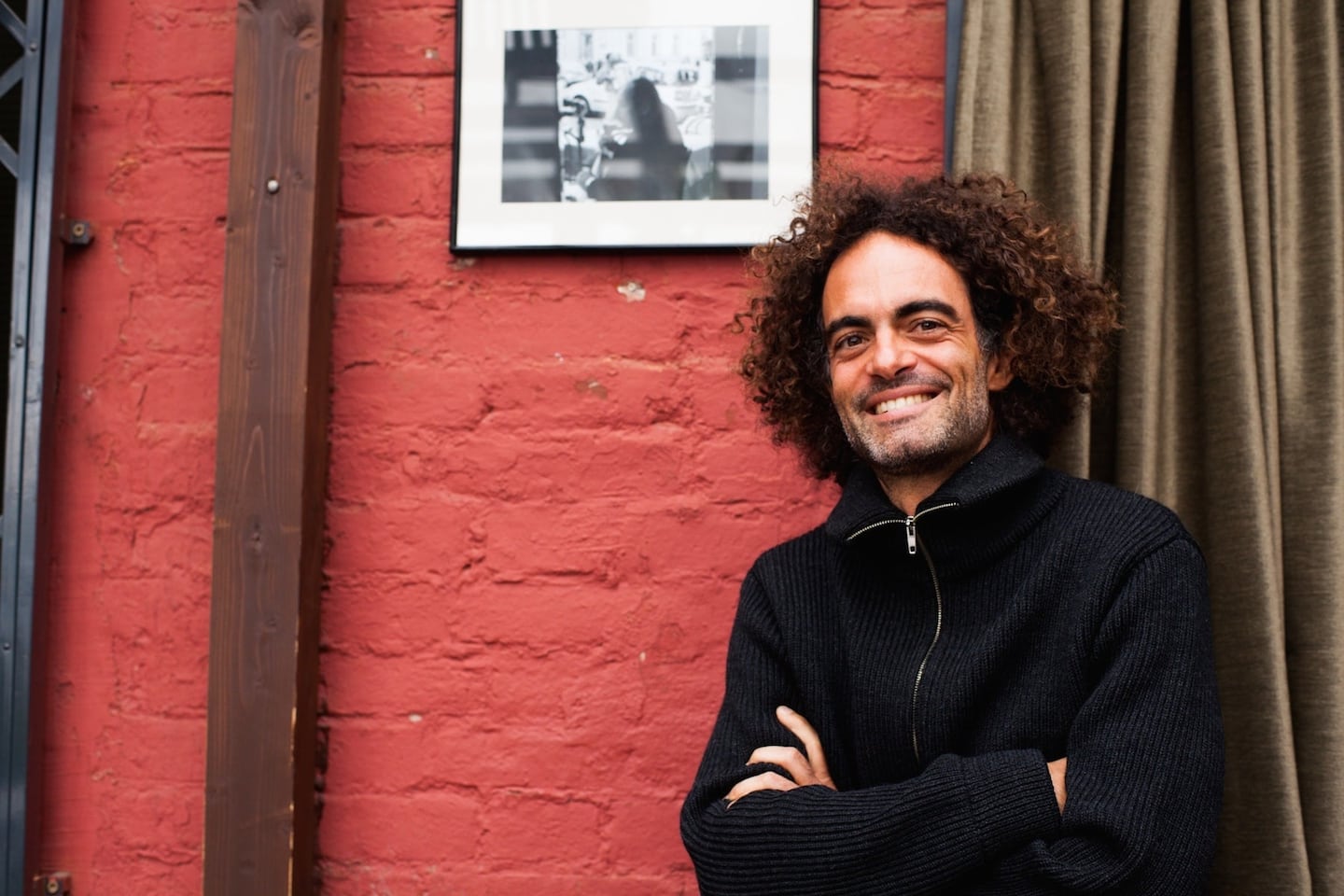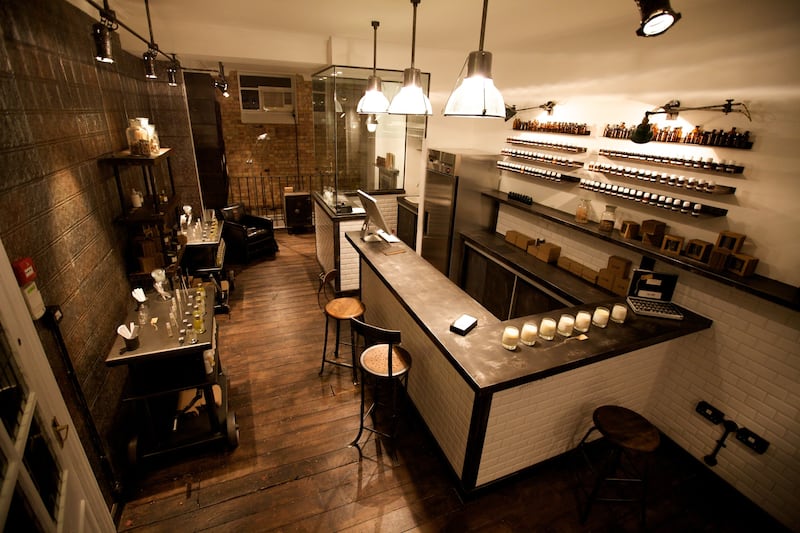
The Business of Fashion
Agenda-setting intelligence, analysis and advice for the global fashion community.

Agenda-setting intelligence, analysis and advice for the global fashion community.

LONDON, United Kingdom — Perfume developer and co-founder of niche fragrance brand Le Labo Edouard Roschi, always had a good brain. But after finishing a rigorous chemistry degree in Switzerland, he didn't fancy going to work as a scientific researcher. He had a creative streak, too, and looked for a job that was sufficiently left-brain/right-brain, leading him to the world of fragrance. "A friend told me about a company [Firmenich] that developed scents and gave me a tour. I found it fascinating to open a little brown bottle that smelled of a freshly cut football field, or another that smelled of hot chocolate. I was amazed by the possibility of capturing such incredible, affective universes in a chemical mixture. That was, I think, my first encounter with perfumes."
Firmenich, where Roschi got his first job after completing 6 months of compulsory Swiss military service, is one of those behind-the-scenes flavour and fragrance developers (for products as varied as floor cleaner, body lotion and fine fragrance) that underpin many of the consumer-facing perfume products on the shop floor. Their work, developing fragrances with 'noses' and discovering new ingredients, whether in laboratory experiments or through exploring territories to find natural sources, is one of the engines of the perfume industry.
While at Firmenich, who are now one of Le Labo’s key partners in creating perfumes, Roschi learned about the art and science of developing fragrances and helped grow the company’s business. He remained at Firmenich for four years, before moving to Armani in 2000. “It was a good stepping stone to the job that I did afterwards, working for Armani fragrances. That’s where I started being very involved in product development and perfume development.”
To make a parallel with the film industry, we are the directors and the perfumer is the director of photography.
Roschi is not a perfumer. He is a perfume developer, which, as he explains, is about defining the creative direction of a fragrance and taking it from kernel of an idea to its neatly packaged place on the shelf of a department store. “We have a clear vision of what our creations will be, but we are not the ones that do the blending. We work directly with perfumers who have had that training and, together, we come up with the mixture we put in the bottle. To make a parallel with the film industry, we are the directors and the perfumer is the director of photography. He or she is the one who is behind the camera, who turns the director’s vision into film. The perfumer translates our artistic vision into a chemical recipe.”
ADVERTISEMENT
During his time at Armani, where he met future business partner Fabrice Penot, Roschi honed his skills in creating and bringing new perfumes to market. “He was in charge of developing its niche brands and managing one of the largest franchises, Acqua di Gio, and I was in charge of the Emporio Armani brand. We were developing entire concepts. It starts from identifying the story that you want to share with the clients, to briefing design agencies for the bottle, perfumers for the perfume, imagining how that story can be told to journalists [and] setting it up in points of sale and distribution channels. It starts from nothing; from ‘What can I do for this year’s launch?’ to the production and selling of a bottle that translates that initial vision.”
Working at Armani was an essential stepping stone in the development of Roschi’s career and creative point of view. “When you first start for a big brand you are not critical, because you are building your expertise and studying the market to see how things are done and why they are done. After a few years you build a critical awareness and only then can you have your own authentic point of view, rather than what someone else has told you is beautiful or cool. It doesn’t come that easily; it comes with practice, study and discipline. You reach a point where you know why something is going to be successful.”
Roschi and Penot became close during monthly trips to Italy to present ideas to Mr. Armani and, while sharing flights and cabs, began dreaming of launching their own brand. "We became friends and after several years, we decided that we were tired of how things were done at Armani and we said, 'Well, we might have a different story we want to tell' and that's when we started brainstorming ideas. After 4 years of working for Giorgio Armani we decided that it was time to spread our wings and take a leap of faith and tell our own story."

Le Labo store in London | Source: Courtesy
After the pair left, they did not waste time in creating Le Labo as co-founders and co-artistic directors, launching their first store in New York in 2006, a year after they resigned from Armani. They funded the venture themselves, with the help of a few friends who contributed seed money, and in the following decade, during which the brand has grown internationally, received no further investment.
At a time, when the market for niche perfumes was gathering pace, in response to consumer boredom with the big brand scents that defined the 1990s (CK1, Tommy Girl, etcetera), Roschi and Penot spotted a gap in the market for a brand that immersed consumers in the experience of the perfumer’s laboratory (hence the, name, Le Labo). Roschi recounts: “What was missing then was the charming and romantic aspect of the perfumer’s work, which was overcast by marketing. People were trying to get attention through funky packaging and crazy adverts, but they were forgetting what was extremely sexy and still is today is the perfumer’s work — the craftsmanship that’s behind the work, and his or her expertise — the ingredients, their origin, the people that pick them, how they picked them how they transformed their vision into a perfume. The whole scenery of a perfumer’s lab is very evocative by itself.”
Le Labo stores, of which there are now 12, (six in the US, two in London, two in Paris, one in Japan and one in Hong Kong with more in the pipeline), are equipped to compose fragrances for consumers on the spot. “The store looks and functions like a perfumers lab. You can see the perfume model being blended, you can smell the ingredients that are sitting on the shelf, you can see them in their different states. You’re welcomed by our lab technicians who are experts in blending and the presence of the perfumer is felt through the setting itself, the beakers and bottles.”
Of course, fragrances themselves take years to develop, so what the consumer sees before them in a Le Labo store is not the invention of a perfume, but the mixing of a perfume. "The day-to-day work of a perfumer probably would not interest a lot of people anyway, because it would be like going back to organic chemistry classes. It's a fine balance," said Roschi.
ADVERTISEMENT
Unusually, he identifies “imperfection” as a key feature of the fragrances that he and Penot devise. “We like to manage — or not manage — imperfection. We like things that are beautiful because they are imperfect. It means rough versus polished and leaving room for something to emerge that’s unexpected. It could be surprising, in that you overdose on one ingredient. If there is not enough of a disparity within the ingredients in the perfume, then you can’t hang on to it — like with polished vinyl versus a rough piece of wood.”
To compose Rose 31, one of their two best sellers and one of the nine scents that Le Labo launched with, Roschi and Penot’s challenge was to make a feminine ingredient approachable for men too. “We worked with the perfumer Daphne Bugey with the idea that we wanted to everyone to be able to wear skirts and make up — even men — to open up a new world with the perfume. Rose can have a scent that’s old fashioned because it smells of hay and of dried grass, it has a strong lychee component. We wanted to get rid of everything that made it too recognisable in terms of its old, classic reminiscence. We covered up the old with more contemporary notes such as woods and spices and musks. Rose 31’s success is that it’s a rose, but it’s the heart of the rose, without everything that makes it easily recognisable and old-fashioned. It’s stiffened up, without the honey tones and the lychee tones of a more usual rose scent. It is disguised.”
Roschi readily admits that it would have been very challenging for he and Penot to gain the trust of perfumers and build their new brand had they not had a track record at Armani. “The fact that we had worked with Armani diminished the risk that they were wasting time with two young guys who didn’t know what they were doing. It can be difficult to work with talented perfumers in the beginning if they don’t trust you and they don’t know where you’re going to take them. You have to prove that it’s worth his or her time to work with you.”
Roschi’s confidence in speaking the language of science, thanks to his chemistry degree and a detailed understanding of how fragrances are composed, has also been essential to his relationships with perfumers. “You need to have a strong understanding of ingredients, understand what they smell like individually and the role that they can play within the larger composition.”
Though Roschi considers the current market as “niched out” and saturated with brands like Le Labo, for those aiming to follow in his footsteps, he advises getting as much experience as possible before taking the plunge and attempting to create a new brand. “You have to have expertise and know the market. Work in it, get interested in it, meet people in it. I wouldn’t bet two cents on someone who wants to build a perfume brand with no experience.”
The firm has been working on a listing since at least 2022, with previous attempts buffeted by volatile markets.
In a three-part series, The Business of Beauty explores how Black founders Monique Rodriguez, Danessa Myricks and more built, launched and scaled their multi-million-dollar businesses. In part one, a look at how these entrepreneurs found their niche and harnessed early lessons that were critical to their growth
There’s something both innocent and concerning about 13-year-olds’ obsession with skincare. Kids will always want to find new ways to express themselves, but the beauty industry has a responsibility to protect its youngest customers.
The family-owned Spanish conglomerate has confirmed it will pursue a public offering in the coming months. After a fairly fast transformation, the company now has a bold diversification strategy and a strong mix of brands in place, making it more ready than it has ever been for the European markets.